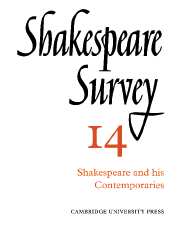Book contents
- Frontmatter
- Studies in Elizabethan and Jacobean Drama since 1900
- Shakespeare and Lyly
- Shakespeare and Mundy
- Marlowe as Provocative Agent in Shakespeare’s Early Plays
- The Tragedy of Revenge in Shakespeare and Webster
- The Simplicity of Thomas Heywood
- The Tragic Vision of Fulke Greville
- Shakespeare v. The Rest: The Old Controversy
- Shakespeare’s Gentleness
- Milton on Shakespeare
- An Unrecorded Elizabethan Performance of Titus Andronicus
- Stratford-upon-Avon a Hundred Years Ago
- International Notes
- Shakespeare Productions in the United Kingdom: 1959
- Three Directors: a Review of Recent Productions
- The Year's Contributions to Shakespearian Study 1 Critical Studies
- 2 Shakespeare’s Life, Times and Stage
- 3 Textual Studies
- Books Received
- Index
- Plate section
Shakespeare and Lyly
Published online by Cambridge University Press: 28 March 2007
- Frontmatter
- Studies in Elizabethan and Jacobean Drama since 1900
- Shakespeare and Lyly
- Shakespeare and Mundy
- Marlowe as Provocative Agent in Shakespeare’s Early Plays
- The Tragedy of Revenge in Shakespeare and Webster
- The Simplicity of Thomas Heywood
- The Tragic Vision of Fulke Greville
- Shakespeare v. The Rest: The Old Controversy
- Shakespeare’s Gentleness
- Milton on Shakespeare
- An Unrecorded Elizabethan Performance of Titus Andronicus
- Stratford-upon-Avon a Hundred Years Ago
- International Notes
- Shakespeare Productions in the United Kingdom: 1959
- Three Directors: a Review of Recent Productions
- The Year's Contributions to Shakespearian Study 1 Critical Studies
- 2 Shakespeare’s Life, Times and Stage
- 3 Textual Studies
- Books Received
- Index
- Plate section
Summary
Shakespeare’s debt to Lyly has never been denied, and it might well seem that any attempt to resurvey the subject could be no more than the gleaning of an already well-harvested field. Yet in fact much more than the gleaning of a few stray ears of corn has been left for those who would apply themselves to the task of making a fresh study of the relationship between these two authors. In particular, it may be said at once that, in the earlier investigations of the theme, there has been a definite tendency to concentrate rather on concrete parallels than on fundamental principles, and thus to forget how far-reaching the effect of the Lylian formula was upon Shakespeare, how it dominated most of his comedies, overpowering even the Jonsonian humour of Twelfth Night and mingling with the Beaumontesque-D’Urfeian romanticism of The Tempest. Furthermore, it may be suggested that Lyly’s example was of no less importance to Shakespeare for what it gave him positively than for its negative effect in raising in him a spirit of opposition.
Naturally, to speak of a Lylian formula or type of comedy is not altogether correct. If that particular sort of comedy should bear the name of any one man, it might rather have been that of Edwardes, who had given an excellent example of the type nearly twenty years before Lyly; and its roots reach back much further—to that extremely interesting, indeed almost seminal playlet Fulgens and Lucrece. But the fact is that Lyly represents for us a genre of which otherwise we should know extremely little; and though it is possible that much of what we may call the Lylian elements in Shakespeare derived either directly or through Lyly from other sources, we are justified in giving his name to English court comedy in general. And there is at least one feature of Lyly's comedies (perhaps the most important of all) that does not occur in Damon and Pythias—they are for the most part love-comedies, in which the mainspring of the comedy itself is love. And that was in those days something practically unique; nor has it been very frequent since then.
- Type
- Chapter
- Information
- Shakespeare Survey , pp. 15 - 24Publisher: Cambridge University PressPrint publication year: 1961
- 3
- Cited by



